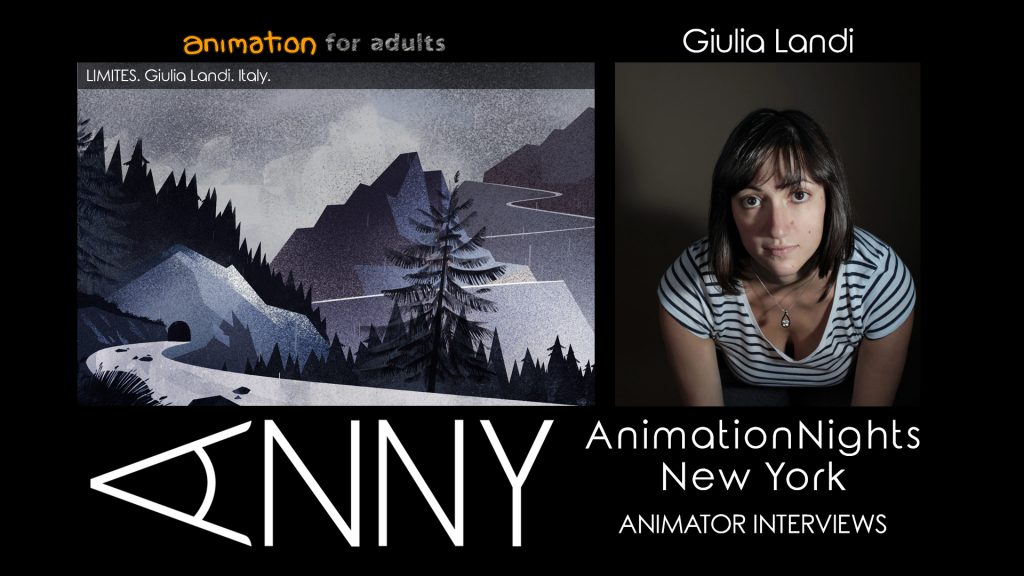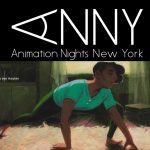ANNY Animator Interview #23 with Giula Landi
AFA ANNY Animator Interview #23 with Giula Landi

Evan Vernon recently sat down with Giula Landi. Landi graduated in Animation at the Centro Sperimentale di Cinematografia of Turin in 2009; since then, she’s been working as an animator for feature films, such as ‘Titeuf‘, ‘Pinocchio‘, ‘The Congress‘ (Ari Folman) and ‘The Red Turtle‘ (Michael Dudok De Wit). In 2012 she started an animation collective to produce a collaborative animated short based on the Cadavre Exquis technique. ‘Limites’ is her first directed short. Limites screens as part of the Animation Nights New York August Program #63 “OTHER LIVES”, on the ANNY Virtual Events platform ONLINE.

Evan Vernon: So Giula, thanks again for being here, just to, we want to talk about Limites but to get things started a bit, tell us about your background. What got you into animation? How did you enter the industry?
Giula Landi: Well, I studied animation in an Italian school, which is a more generic School of Cinema, but it has a department for Animation, and it’s based in Turin. It’s a three year long course and after that it was pretty hard to imagine a job, even imagine it, in Italy, at that moment. It was around 2010, let’s say. I got the chance to do an internship at Cartoon Network in London for a couple of months and then I had the chance also to work in feature films, in different Productions in Europe and that’s how it started. Once you start working on a team, you get people telling you about new projects. I started moving around Europe for around 10 years, working for other people’s movies, which was amazing and it made me grow incredibly. It’s all about learning from other very experienced animators and amazing directors like we had about the region. I don’t know if you have seen the Red Turtle. It was an amazing experience to work with Michaël Dudok de Wit. He is my hero, my animation hero and it was so great. That was my experience.
Evan Vernon: Well, thank you for giving us some background there, Julia, you know, you mentioned working on the Red Turtle, which is a very high profile film by a critically acclaimed director, Michaël Dudok de Wit. You’ve also worked for Salvador Simó, I think Ari Folman recently. The list really kind of goes on and on so I think that the fact you’ve managed to work under or work with all of these industry autors really attests to your skill as an artist. You said that DeWitt was one of your heroes. Do you think that he and other artists have influenced your own style as you’ve started to create films, independently?
Giula Landi: Somehow, even if not directly. What I really appreciated about Dudok de Wit is his poetry. He’s very into telling stories with such a delicate point of view. It’s not about the action, it’s more about a lot of subtle things that are intertwined in people’s experiences. I really love that about him. Of course, I don’t even think about comparing what I try to do with de Wit but the style that he has in storytelling, it’s something that I really like. Not every movie I worked on has influenced me so much, sometimes it’s mainly work, but every project has definitely taught me how to deal with people. When you’re working on a personal project, especially in animation, it’s very hard to do it on your own. I mean, for me, it’s quite impossible to think about something like that. You have to work with other people and be able to express your own point of view, your own vision, to someone else. That’s the tricky part, and teamwork, it’s something that really pushes you to do that.
Evan Vernon: You gave us a lot of good information there Julia, you know, it’s interesting, just the other month, we were talking to Art directors at an Animation studio and they talked about the same thing that you mentioned. Animators must not only be skilled at their craft, but also good with people, at managing people. There’s so much time and effort and labor that goes into creating animation, and it’s easy, from the outside looking in, to take that for granted. We don’t always think about it as the viewer.
Giula Landi: No, sure.
Evan Vernon: Your comment about Dudok de Wit’s storytelling style was really interesting. The more I think about it, The Red Turtle is a silent film, and there’s this kind of soft romance to it you kind of see in Limites, your short film we are screening. So, if you don’t mind, I’d like to kind of use that as a segue. Tell us about Limites, what inspired this story? Where did it come from?
Giula Landi: After working for so many movies, I really had the need to try and make something on my own. I had the chance because a friend of mine was working in a documentary production in Italy. I didn’t have much of a budget, almost nothing, but it was something so important for me, that I decided just to invest. Tommaso Perfetti, is from Milano and often works with institutions and museums doing research about the mountains around Milano, because he’s from there. He received financing to develop a project about mountains and I thought I could give a point of view which wasn’t about just the mountains, but about how we see the mountains. The whole point was to tell how the Alps basically are being abandoned by people. I mean, there are a lot of tourists and there are a lot of people going there skiing and using the mountains as a background for their amazing pictures, but there are not many people living there and cultivating things. On one side, the mountains are being idealized for for urban people who dream about nature and being lost in something completely different from their urban environments. At the same time, the areas are not dead but there are places which have been completely left by humans. Of course, people have started moving away because it’s hard. It’s not just a postcard. Nature is rough and life is rough there. It makes sense. There’s no comfort there. I wanted to try to show this contrast between the ideal vision of someone who has never been to the area as a settler, and the actual truth the actual situation. I don’t know if I managed.
Evan Vernon: Well, Limites is a beautiful film, Giula, and you gave us a lot to unpack right there. You know, I think about the woman that you feature in this story who decides to leave the city and return to the Alps. And you talk about the fact that it’s rough that it’s this inhospitable environment, but there’s this almost kind of spiritual attraction that she has for it. Do you think that’s kind of what you were maybe advocating for this almost like a spiritual return to Nature?
Giula Landi: Probably, Yeah! I mean, you do live in New York, right?
Evan Vernon: I’m in London, right now.
Giula Landi: Okay, but it’s still a huge city. So I mean, both Nature and Spirituality are things we tend to miss. So yes, probably. Definitely.
Evan Vernon: What does the film mean to you, personally?
Giula Landi: Well, there are definitely autobiographical elements. The need to find a new and different kind of life, something a bit more meaningful, somehow more connected to Nature. It is definitely something that I would like to try and it’s been something that has been kind of looping in my head for awhile now, even more since the pandemic. This is something that has been crossing many people‘s minds and many people have started to take action in Italy. There are many people who have started thinking, “Oh, maybe I should buy a house somewhere and plant, grow my own vegetables”. I think we are closer to the reality of this moment.
Evan Vernon: Well, thanks again for sharing Giula. You know, regardless of how you read it. I think that the kind of the power of nature, the allure of it is definitely evident in your film and viewers will enjoy it. Your resume is very prolific. I look at everything you have done as an artist, and you stated earlier that this was your first independent short. Have you considered maybe creating a feature of your own one day?
Giula Landi: Yes and no. I have to admit the amount of work that a feature film in animation requires really scares me, especially having worked with the Salvador Simó. He is a great director and I really loved working with him. I was supervising the team, and it was the first time I did something like that in a bigger scale production. I realized the amount of stress and pressure you endure and I’m not sure I would be able to handle it, but who knows?! Never say never. I’m sure it requires a lot of motivation. I really appreciate people who take this path and have an incredible amount of energy to carry everybody. The directors really are the engine of the movie, both practically and spiritually. If a director is not strong, and not able to deal with people in a very positive way, because that’s what makes people happy to work with you, it’s very hard to finish a movie, So, I don’t know. I will have to think about it.
Evan Vernon: Only time will tell and that’s a big question. Your short film has shown us a very distinct voice and style. So who knows, maybe it’s something that you’ll continue to hone over time and, given sufficient funding and resources, to Parlay into a feature film.
Giula Landi: …and Time.
Evan Vernon: We hope so. You talked about struggling to find work in Italy as an animator. I might be oversimplifying, but I think Italian animators might be a bit underrepresented in the animation community, when it comes to directors.
Giula Landi: It’s changing right now. There are new generations from our school and others, so things are slightly changing, not in the feature film field, more in short films and documentaries. It’s true that it’s quite unrepresented.
Evan Vernon: While we’re on the topic of Italian animators. I’m not sure if you can tell us much but I did read that you’re currently working with director Enzo Douluo, who is a pretty familiar face from my childhood and probably several other viewers. I remember watching “How the Toys Saved Christmas” when I was a little kid. He’s got other titles to his credit. But yeah, can you tell us about your work with Enzo and what you’re currently doing now?
Giula Landi: I’ve worked with him a couple of times and also with the previous feature film that he did about Pinocchio, he did a more Italian version. Now, he’s working on a movie, based on a novel, called “The Great Hand of Sorrow” and it’s an amazing story. It’s about something very delicate and very complicated to tell, especially to children. It’s about the death of someone really important, a story of the relationship between a Grandmother and Grandchild. It is about the passage this person has to do, to get to the other world, but with a more positive acceptance and flow. It’s a challenge to tell such a story but I think he managed. I mean, it’s not a heavy movie. It’s moving, Of course. It can make you cry, of course, but also it’s sweet. It’s very sweet. So, I really hope this movie can reach more people. Because the problem with European animation, it kind of stays a bit hidden from the big cinemas and big corporations, because they’re small productions, and distribution is quite hard. I really hope it manages to travel.
Evan Vernon: Yeah, me too. It sounds like a wonderful film. I’d love to see it. I’m sure our readers would love to see it. Death, you know, that’s a difficult topic to address, especially with children, but if you can find the right storyteller to talk about it, it’s a necessary thing to discuss.
Giula Landi: It is. Exactly as you said, it’s necessary.
Evan Vernon: You’ve dealt with titles that also tackle sensitive topics. The Red Turtle talks about mortality.
Giula Landi: Yeah, I‘m kind of getting specialized into tough topics because I’ve been working on Anne Frank that is talking about the Holocaust and on another movie we’ve talked about Cambodia. I mean, yeah, I think I should put it on my CV, I’m specialized in tough animation.
Evan Vernon: I do think that says a lot about you as an artist, not just anyone handle these subjects. It’s no surprise that Enzo has you on his team. So, best of luck to you with that project, I really hope you enjoy it, and I hope to see it in theaters.
Giula Landi: Yes.
Evan Vernon: For all those listening in, if you’d like to watch Limites, it’s going to be part of the Animation Nights New York online, screening event, this Sunday, August 22nd. The film will be available from 11 a.m. To 11 p.m. Eastern time. In the meantime, if you’d like to continue following Julia and her work. We will plug all her relevant, social media, handles and websites in the interview description. Giula, once again, thank you so much for your time. It’s been a real treat having you. All the best to you in the future. Giula Landi: Thank you very much. It’s been a pleasure for me as well. Thank you.
Social Media Links
Vimeo: https://vimeo.com/user2867987
Instagram: https://instagram.com/giu.landi
Blog: http://giulialandi.blogspot.com/
Interview by Evan Vernon.
You can subscribe to The AFA Podcast on iTunes, Acast, and Stitcher.
About ANNY: Animation Nights New York is a curated monthly screening event and annual festival first established in NYC in 2015. The event showcases animated short films and virtual reality animation experiences from all around the world and both project submission and admission to monthly screenings of in-competition films are free to the general public. If you would like to submit a VR/AR/Game or short film project, you can find Animation Nights New York on Film Freeway.
ANNY Exchange is our talent connect initiative. We connect animation talent to opportunity using our festival as a vehicle.
ANNY Best of Fest is our annual festival held in mid November.



